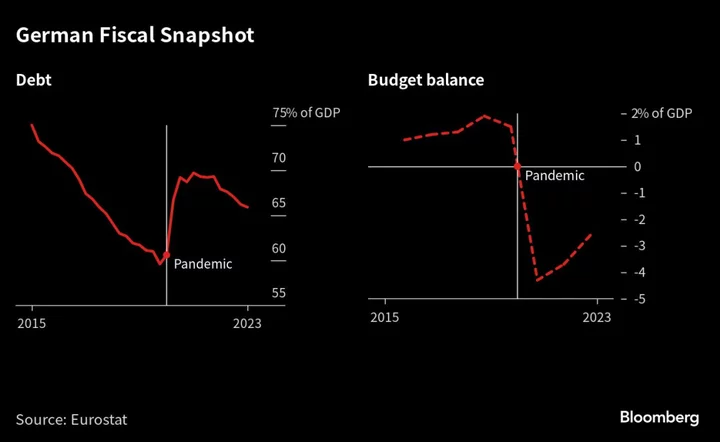Chancellor Olaf Scholz rejected calls for higher, debt-financed federal spending to boost growth and said Germany is well positioned despite its current weak economic condition.
Europe’s largest economy has “the best pre-requisites to ensure we’ll still be playing in the top league technologically in ten, 20 and in 30 years’ time,” Scholz told Mediengruppe Bayern in an interview published on Saturday.
The Social Democrat leader said Germany “mustn’t be badmouthed as a business location” but instead has good economic prospects.
Germany’s economy ministry recently said it’s preparing aid worth about €20 billion ($22 billion) to support the development of local semiconductor production in the coming years with money from the off-budget Climate and Transformation Fund.
Read More: TSMC to Build $11 Billion German Plant With Other Chipmakers
Scholz’s comments came a day after business confidence data showed Germany took another hit in August, despite the economy managing to exit a recession in the second quarter. The Ifo institute’s sentiment gauge dropped to 85.7 from a revised 87.4 the previous month, falling short of the median estimate in a Bloomberg survey.
The data on Germany, for decades Europe’s trade-driven engine of growth, will do nothing to quell concerns that a protracted period of weakness is likely. Germany is the only major country whose output is forecast to shrink this year.
Read more: Germany Faces Grim Outlook as Business Confidence Worsens
Current growth is “unsatisfactory,” Scholz told the Bavarian local-newspaper publisher. He added that Germany is feeling the brunt of a weakening global economy because of its dependence on exports.
Scholz rejected criticism that Germany’s problems have been exacerbated by his government’s reluctance to boost deficit spending.
“I’m not sure that the Union actually thinks we should take on more debt,” he said, adding that Germany added hundreds of billions of euros in debt in recent years to weather the pandemic and to cushion the consequences of the Russian invasion of Ukraine and the resultant spike in energy prices.
He also rejected calls to subsidize electricity prices for large businesses, a step some lawmakers have called for. “We don’t just lack the money to subsidize the price of electricity in the long term, but also the legal options,” Scholz said.

